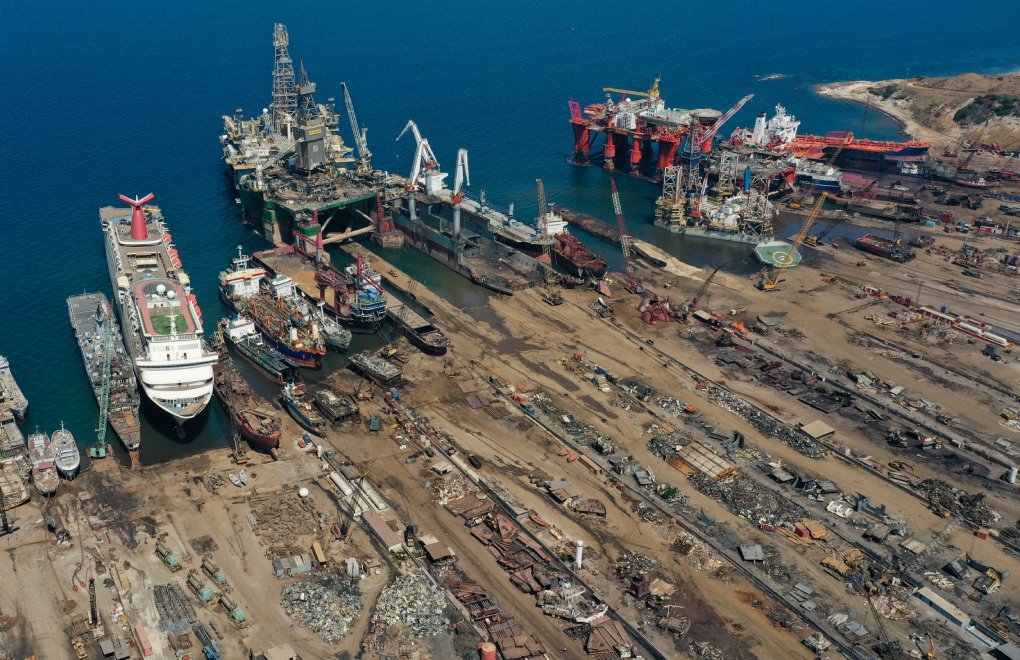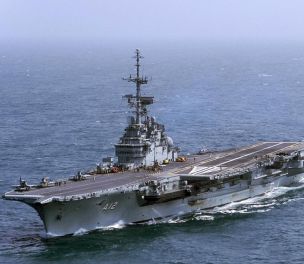Photo: AA
Click to read the article in Turkish / Kurdish
The Health and Safety Labor Watch (İSİG) has released a report about worker deaths in the Aliağa Ship Recycling Facility in İzmir, western Türkiye, amid a public debate about an aircraft carrier which will be dismantled in the facility.
Environmental groups have expressed concerns that the dismantling of the vessel belonging to Brazil's army, São Paulo, will cause the release of tons of dangerous substances, including asbestos.
While the Ministry of Environment played down the criticism, saying that the ship contains only nine tons of asbestos. However, it was revealed that after the dismantling of an identical ship, Clemenceau, which was also built by France, contained 760 tons of asbestos.
CLICK - Aircraft carrier set to head to Türkiye for dismantling amid asbestos concerns
According to the İSİG report, at least 97 workers in Aliağa were killed on the job between 2013, when the Occupational Health and Safety Law was enacted, and June 2022.
The most common causes of death were being crushed, explosion, fire and falling from a height, the report showed.
Twenty-eight percent of the deaths occurred in ship-breaking, and 27 percent occurred in "metal" work.
Over the past year, seven ship-breaking workers were killed.
"Every year, about 2,000 workers are killed while working in Türkiye. There are about 1,500 ship-breaking workers in Aliağa. Proportionally, the mortality rate in the Aliağa ship-breaking sector is 30 times higher the official worker mortality rate in Türkiye," said the İSİG.
Also, three out of every 10 worker killings are not reported in the national press, it noted.
Precarious work
Subcontracted and precarious employment is very common in Aliağa, the İSİG said. All of the 11 construction workers and 11 of the 16 chemistry workers who were killed between 2013 and 2011 were subcontracted workers.
Two women and three refugee workers were among the killed while no child workers' deaths were found. Only eight of the killed workers were union workers.
The dismantling of São Paulo
The SÖK Denizcilik company last year got a 1.85 million dollar contract for the dismantling of the vessel, which is now decommissioned by Brazil.
The ship contains tons of dangerous chemicals, including asbestos, poly aromatic hydrocarbons (PAHs), poly chlorinated biphenyls (PCB), dioxins and furans, and various heavy metals (mercury, lead, cadmium, arsenic, chromium, nickel, manganese, zinc, iron, etc.), organic tin compounds and isocyanates.
The Ministry of Environment, Urbanization and Climate Change permitted the dismantling.
Today, the use of asbestos is restricted or prohibited in many countries. It has been banned in Türkiye since 2010.
Despite the bans, 125 million people are exposed to asbestos every year in their workplaces and about 100,000 workers die due to exposure to asbestos.
Ship dismantling in İzmirAfter a ship accident on March 22, 2013, oil sludge spilled into the sea and the Çandarlı beach of Dikili district was covered with oil sludge. Two years after this accident, a tanker named Kuito with a daily oil processing capacity of 100,000 barrels, which was brought to Aliağa for dismantling, was investigated five times more radioactivity than limit values was detected. A lawsuit was filed for the cancellation of the dismantling but the İzmir 3rf Administrative court ruled for the stay of execution months after the ship was dismantled. A similar process happened with the ETHANE ship. In 2018, it was revealed that oil was deliberately discharged from a ship named Harrier and oil pollution was observed on Foça coasts. Substances such as mineral oils, heavy metals, polycyclic aromatic hydrocarbons (PAH), polychlorinated biphenyls (PCB), asbestos, organotin compounds, dioxin are listed as environmental pollutants in shipbreaking plants. These pollutants get into the air. European countries and the US have withdrawn from the ship dismantling sector since the 1980s. |
(HA/VK)





